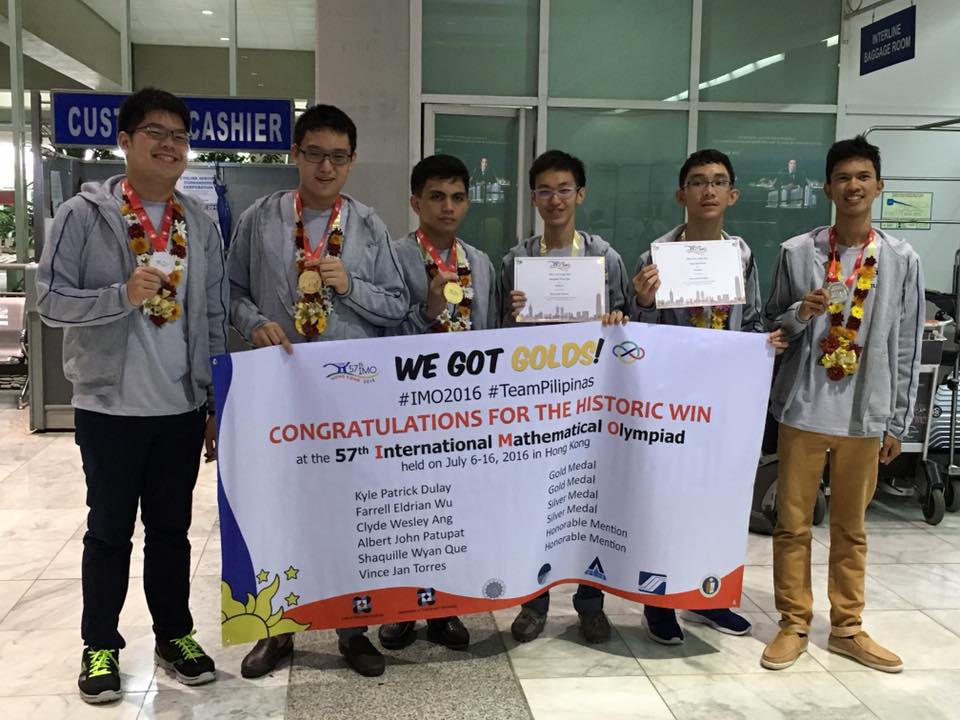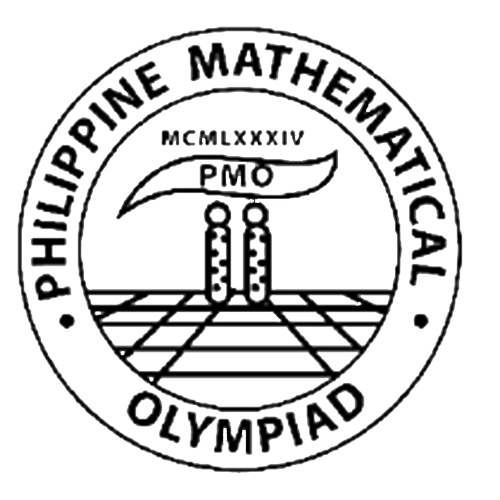A Report on the Philippine Participation to the 57th International Mathematical Olympiad
— By Richard Eden and Louie John Vallejo

(Photo from the Facebook page of DOST-SEI. (Starting from the left) Ang, Wu, Dulay, Que, Torres, Patupat)
The Philippines just won its first Gold Medal in the International Mathematical Olympiad. In fact, we won two Gold Medals, two Silver Medals, and two Honorable Mention awards.
The International Mathematical Olympiad (IMO) is the most prestigious mathematics competition for high school students and is the oldest of all the International Science Olympiads. This year, there were over 600 students coming from 109 countries. This makes the IMO the largest of all math competitions in terms of participating nations. Each country can only send at most six contestants, who will be accompanied by a Team Leader, a Deputy Team leader and possibly some observers.
The IMO was first held in 1959 in Romania, and has been held annually in various host countries. This year, it was held in Hong Kong from July 6 to 16, 2016.
The Competition
Questions at the IMO come from four subject areas: geometry, algebra (polynomials, inequalities and functional equations), number theory and combinatorics. Months before the IMO, participating countries submit candidate problems which are then screened by a committee. The roughly 30 pre-selected problems are then presented to the IMO Jury composed of the Team Leaders of each participating country. For this reason, the Team Leaders have to arrive at the host country earlier than the Deputies and Contestants, and are forbidden from interacting with them until the end of the exams. Over the span of about four days, the Jury then deliberates and finalizes the six IMO problems, their various translations and marking schemes.
The six problems appearing at the IMO are certainly very difficult that even the easiest of these is several times harder than the math problems that are usually encountered by high school students. These six problems are administered to all contestants over the span of two days, and the three problems in each day are to be tackled within four and a half hours.
Each question at the IMO is worth seven points. Owing to the difficulty of all six problems, a contestant who completely solves one problem is immediately given an Honorable Mention award. After all the papers have been marked jointly by an IMO committee and the country’s Team Leaders, cut-off scores for Gold, Silver and Bronze medals are decided by the IMO Jury. The total number of medals that are awarded is no more than roughly half the number of participants.
The Philippine Team
Our country’s team was selected from the 20 National Finalists of the Philippine Mathematical Olympiad. The finalists were invited to join the Math Olympiad Summer Camp (MOSC) which took place this April and May at the Institute of Mathematics of UP Diliman and the Mathematics Department of Ateneo de Manila University.
This year, the trainers at the MOSC were Richard Eden (AdMU), Louie John Vallejo (UP Diliman), Jose Ernie Lope (UP Diliman), Ma. Carmen Amarra (UP Diliman), Christian Chanshio (AdMU), Gari Lincoln Chua (AdMU), Jerome Dimabayao (UP Diliman), Job Nable (AdMU), John Gabriel Pelias (UP DIliman), Adrian Reginald Sy (MIT), and Timothy Robin Teng (AdMU).
The Team is composed of Clyde Wesley S. Ang (Chiang Kai Shek College), Kyle Patrick F. Dulay (Philippine Science High School – Main), Albert John L. Patupat (De La Salle University Integrated School), Shaquille Wyan T. Que (Grace Christian College), Vince Jan F. Torres (Sta. Rosa Science and Technology High School), and Farrell Eldrian S. Wu (MGC New Life Christian Academy). Richard Eden is the country’s Team Leader and Louie John Vallejo the Deputy Team Leader.
The MOSC and the Philippine participation to the IMO are joint projects of the DOST Science Education Institute and the Mathematical Society of the Philippines. This year, these projects were supported by the UP Diliman Institute of Mathematics and the ADMU Department of Mathematics.
The Results
These were the scores of our contestants: Clyde (24), Kyle (29), Albert (23), Shaquille (15), Vince (12), and Farrell (30). The cut-offs this year were 29 for Gold, 22 for Silver, and 16 for Bronze. Thus, Kyle and Farrell won Gold Medals, Clyde and Albert won Silver Medals, and Shaquille and Vince won Honorable Mention Awards.
The Philippine Team got a total score of 133 and ranked 17 among 109 participating countries (85th percentile). This brought us closer to Southeast Asian powerhouses like Thailand (#12) and Vietnam (#11), and ranked us higher than usually strong countries like Bulgaria (#18), Germany (#19) and Romania (#20). This is the best finish of the country since it first participated in 1988.
Gratitude
While only the names of the six contestants and the two team leaders appear in the official records, this achievement is not ours alone. Our stellar performance is the fruit of the labor of various people who came before us. They recognized that this is something worth pursuing.
We thank the Team Leaders of recent years – Dr. Jose Ernie Lope, Dr. Julius Basilla, and Dr. Ian June Garces – for instituting and developing the current training program we have for our IMO participants. We are reaping the fruits of what they started.
We thank the Team Leaders of the previous years, for devoting their time and effort, when we were still struggling.
We dedicate this to Dr. Jose Marasigan, our very first Team Leader, who started it all in 1988. He did not live long enough to see our first gold medal. Doc Mara, this is also for you.

Latest Comments